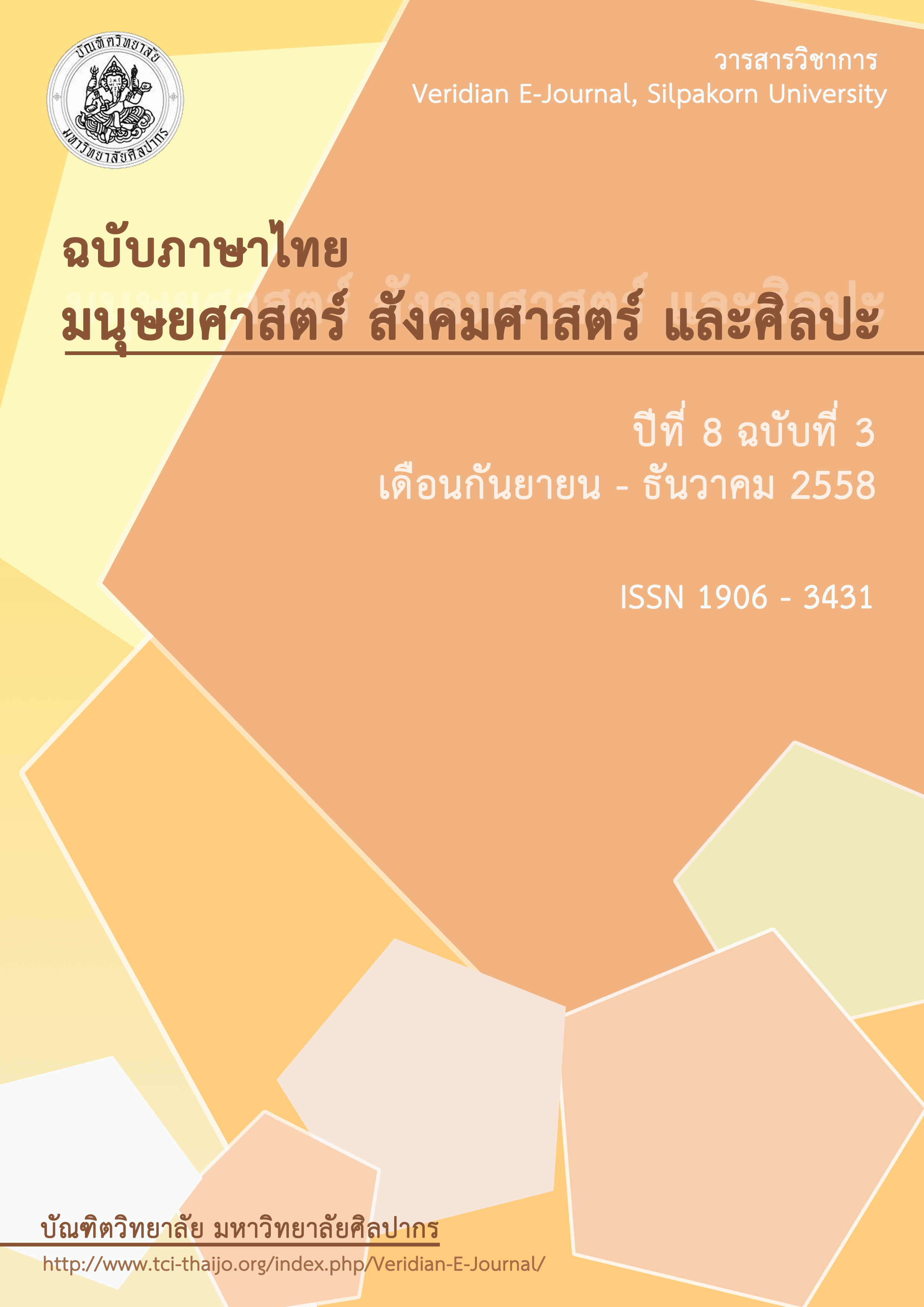การให้โปรแกรมความรู้และฝึกทักษะแก่ผู้ดูแลเพื่อลดความวิตกกังวลในการดูแลผู้ป่วย โรคหลอดเลือดสมองของโรงพยาบาลบ้านแพ้ว (องค์การมหาชน)
Main Article Content
Abstract
บทคัดย่อ
การวิจัยครั้งนี้เป็นการวิจัยรูปแบบกึ่งทดลอง มีวัตถุประสงค์เพื่อเปรียบเทียบผลของการใช้โปรแกรมความรู้และฝึกทักษะเพื่อลดความวิตกกังวลแก่ผู้ดูแลผู้ป่วยโรคหลอดเลือดสมองที่เข้ารับการรักษาแบบผู้ป่วยในของโรงพยาบาลบ้านแพ้ว (องค์การมหาชน) ระหว่างเดือนตุลาคม พ.ศ. 2557 – มีนาคม พ.ศ. 2558 กลุ่มตัวอย่างประกอบด้วยผู้ดูแลจำนวน 60 คน อายุตั้งแต่ 15 ปีขึ้นไป มีสุขภาพร่างกายแข็งแรง และสมัครใจเข้าร่วมโครงการ แบ่งเป็นกลุ่มทดลอง จำนวน 30 คน และกลุ่มควบคุม จำนวน 30 คน ผู้ดูแลในกลุ่มทดลองจะได้รับโปรแกรมความรู้และฝึกทักษะตามโปรแกรมที่ผู้วิจัยสร้างขึ้น ในขณะที่กลุ่มควบคุมได้รับการพยาบาลตามปกติ กลุ่มตัวอย่างทั้งสองกลุ่มนี้ได้รับการประเมินความรู้และทักษะเกี่ยวกับการดูแลผู้ป่วยโรคหลอดเลือดสมองด้วยแบบทดสอบความรู้และแบบประเมินทักษะ และประเมินความวิตกกังวลต่อการดูแลผู้ป่วยโรคหลอดเลือดสมองก่อนและหลังกระบวนการทดลอง ด้วยเครื่องมือที่ใช้ในการศึกษาที่ผู้วิจัยได้พัฒนาขึ้นมา สถิติที่ใช้ในการวิจัยได้แก่ ร้อยละ ค่าเฉลี่ย () ส่วนเบี่ยงเบนมาตรฐาน (S.D.) การทดสอบค่าที (t-test) และการวิเคราะห์ค่าสหสัมพันธ์ของเพียร์สัน (Pearson Product Moment Correlation)
ผลการศึกษาพบว่า ความรู้และทักษะเกี่ยวกับการดูแลผู้ป่วยโรคหลอดเลือดสมองของกลุ่มทดลองหลังการทดลองสูงกว่าก่อนการทดลองอย่างมีนัยสำคัญทางสถิติที่ระดับ .05 ส่วนความวิตกกังวลต่อการดูแลผู้ป่วยโรคหลอดเลือดสมองของกลุ่มทดลองหลังการทดลองต่ำกว่าก่อนการทดลองอย่างมีนัยสำคัญทางสถิติที่ระดับ .05 และทักษะเกี่ยวกับการดูแลผู้ป่วยโรคหลอดเลือดสมองของกลุ่มทดลองสูงกว่ากลุ่มควบคุมอย่างมีนัยสำคัญทางสถิติที่ระดับ .05 ส่วนความวิตกกังวลต่อการดูแลผู้ป่วยโรคหลอดเลือดสมองของกลุ่มทดลองต่ำกว่าความวิตกกังวลต่อการดูแลผู้ป่วยโรคหลอดเลือดสมองของกลุ่มควบคุมอย่างมีนัยสำคัญทางสถิติที่ระดับ .05 นอกจากนี้ยังพบว่าความรู้และทักษะเกี่ยวกับการดูแลผู้ป่วยโรคหลอดเลือดสมองไม่มีความสัมพันธ์กับความวิตกกังวลต่อการดูแลผู้ป่วยโรคหลอดเลือดสมอง
Abstract
This Quasi – experimental research aimed to compare the results of implementation of knowledge and skill training program to caregivers who cared for stroke patients admitted in Banphaeo Hospital (Public Organization) from October 2014 to March 2015. The subjects of the study comprised 60 caregivers, aged over 15 years old, healthy and they were willing to involve in the study. They were divided into experimental group and control group, 30 persons for each group. The experimental group received knowledge and skill training program designed by the researcher, whereas the control group received a knowledge and skill training program offered by the hospital personels. All subjects were evaluated in terms of knowledge, skill to care for stroke patients, and anxiety relating to the care of stroke patients before and after the experiment. Research tools were developed by the researcher. Data were analysed by percentage, arithmetic mean (), standard deviation (S.D.), t-test and Pearson Product Moment Correlation (r).
The result indicated that, after the experiment, scores of knowledge and skill care for stroke patients of the experimental group were significantly higher than those before the experiment at .05 level. Whereas anxiety relating to care of stroke patients of the experimental group after the experiment was significantly lower than that before the experiment at .05 level. After the experiment, skill to care for stroke patients of the experimental group was higher than that of the control group, and anxiety relating care of stroke patients of the experimental group was lower than that of the control group. There was no correlation between knowledge and skills to care of stroke patients and anxiety relating to the care of stroke patients.

